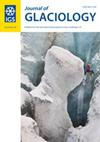Ice geometry and thermal regime of Lyngmarksbræen Ice Cap, West Greenland
IF 2.6
3区 地球科学
Q2 GEOGRAPHY, PHYSICAL
引用次数: 0
Abstract
Abstract Observations remain sparse for peripheral glaciers and ice caps in Greenland. Here, we present the results of a multi-frequency radar survey of Lyngmarksbræen Ice Cap in West Greenland conducted in April 2017. Radar measurements show thick ice of up to ~120 m in subglacial valleys associated with the largest outlet glaciers, while relatively thin ice cover the upper plateau ice divides, suggesting future vulnerability to ice cap fragmentation. At the time of the radar survey, Lyngmarksbræen Ice Cap had a total volume of 0.82 ± 0.1 km 3 . Measurements show a 1.5–2 m thick end-of-winter snowpack, and that firn is largely absent, signifying a prolonged period of negative mass balance for most of the ice cap. The thermal regime of Lyngmarksbræen Ice Cap is investigated through analysis of scattering observed along radar profiles. Results show that the ice cap is largely below the pressure melting point, but that temperate ice exists both in deep basal pockets and in shallow zones that some places extend from ~15 m depth and to the ice base. The distribution of shallow temperate ice appears unrelated to variations in ice thickness; instead we find a strong correlation to the presence of nearby surface crevasses.西格陵兰Lyngmarksbræen冰帽的冰的几何形状和热状态
格陵兰岛周边冰川和冰盖的观测数据仍然稀少。在这里,我们展示了2017年4月对西格陵兰Lyngmarksbræen冰盖进行的多频雷达调查结果。雷达测量显示,与最大的出水口冰川相关的冰下山谷的厚冰可达~120米,而相对较薄的冰覆盖在高原上部的冰缝上,这表明未来易受冰盖破碎的影响。在雷达调查时,Lyngmarksbræen冰帽的总积为0.82±0.1 km 3。测量结果显示,冬末积雪厚度为1.5-2 m,而且积雪基本上不存在,这表明大部分冰盖长期处于负质量平衡状态。通过分析雷达剖面观测到的散射,研究了Lyngmarksbræen冰盖的热状态。结果表明,冰盖大部分在压力熔点以下,但温带冰既存在于深基底口袋中,也存在于一些从~15 m深度延伸到冰基的浅带中。温带浅冰的分布似乎与冰厚的变化无关;相反,我们发现这与附近地表裂缝的存在有很强的相关性。
本文章由计算机程序翻译,如有差异,请以英文原文为准。
求助全文
约1分钟内获得全文
求助全文
来源期刊

Journal of Glaciology
地学-地球科学综合
CiteScore
5.80
自引率
14.70%
发文量
101
审稿时长
6 months
期刊介绍:
Journal of Glaciology publishes original scientific articles and letters in any aspect of glaciology- the study of ice. Studies of natural, artificial, and extraterrestrial ice and snow, as well as interactions between ice, snow and the atmospheric, oceanic and subglacial environment are all eligible. They may be based on field work, remote sensing, laboratory investigations, theoretical analysis or numerical modelling, or may report on newly developed glaciological instruments. Subjects covered recently in the Journal have included palaeoclimatology and the chemistry of the atmosphere as revealed in ice cores; theoretical and applied physics and chemistry of ice; the dynamics of glaciers and ice sheets, and changes in their extent and mass under climatic forcing; glacier energy balances at all scales; glacial landforms, and glaciers as geomorphic agents; snow science in all its aspects; ice as a host for surface and subglacial ecosystems; sea ice, icebergs and lake ice; and avalanche dynamics and other glacial hazards to human activity. Studies of permafrost and of ice in the Earth’s atmosphere are also within the domain of the Journal, as are interdisciplinary applications to engineering, biological, and social sciences, and studies in the history of glaciology.
 求助内容:
求助内容: 应助结果提醒方式:
应助结果提醒方式:


